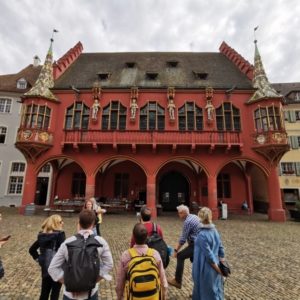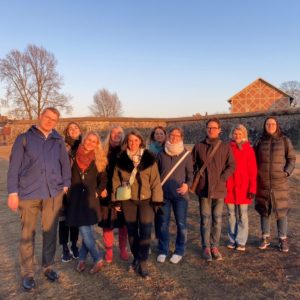Material
Enhancing coherence in teacher education through a European teacher perspective
Information
Name of the institution(s) or teams
Université Côte d’Azur, Université Aix-Marseille, PH Freiburg
Format
Video
Title
Enhancing coherence in teacher education through a European teacher perspective
Keywords
European teacher, virtual exchange, transnational collaborations
Topic
Guest lectures: Invite other partners physically or virtually
Goals
As teacher educators working in a European context, our goal was to organize a panel discussion that served as a springboard for further discussions. We aimed to:
- Explore the concept of being a European teacher and delve into its meaning.
- Provide an update on current projects and research within the field.
- Address the significance of coherence when teachers from diverse institutions across Europe collaborate in practice.
Domains/aspects of internationalization (fill in the category from the grid)
In this webinar, the significance of coherence is addressed when teachers from diverse institutions across Europe collaborate in practice.
Target group
Teachers, teacher educators, student teachers
Educational level and study year
All levels
Context information users would need to understand the digital tool
(e.g., about the TE system, curricular integration)
The webinar (recorded on September 5th 2022) combines insights based on the following two European projects: ConneEcTEd (Coherence in European Teacher Education) and UNI-T Academy (eUropeaN cIvic Teacher Academy).
Participants: Vasileios Symeonidis (PH Freiburg), Maria Impedovo (Aix-Marseille), Christine SCHMIDER and Cindy De Smet (Université Côte d’Azur)
More project information:
Language of the example
English
License
Copyright
In how far does your approach strengthen the internationalization (of the curriculum) in Teacher Education?
In teacher education, the notion of coherence refers to an active process of interrelated professional learning and reflection, and to the connection between different domains of competence, such as content knowledge, pedagogical content knowledge, and practical and theoretical knowledge. Research suggests that a “coherent” teacher training can only be achieved if the student population also perceives the materials and structures as coherent. This is where the idea of a European teacher can offer new perspectives on a coherent teacher education.
The internationalization of teacher education exposes students and teacher educators to a variety of education systems, teaching styles, and professional identities. Instead of feeling like mere observers, they are expected to actively consider and reflect on their own professional roles and professions. Transnational collaborations focusing on the idea of a European teacher foster reflective practice, an intercultural awareness, and a special sensibility for different approaches to thinking, doing, and believing because of their ongoing confrontation with foreign (educational) cultures. As a result, they enhance key teaching competencies such as differentiation, self-reflection, and dealing with heterogeneity. The strengthening of such competences allows teacher education students to perceive the links between the different areas of their study field and create coherent and productive relationships between theory and practice.
During our webinar, we intend to discuss how a European teacher can offer new perspectives on a coherent teacher education.
Which dimensions of digital transformation in teaching for teacher educators did you incorporate (utilize)?
In this webinar, the significance of coherence is addressed when teachers from diverse institutions across Europe collaborate in practice. A concrete example of how to design and develop the virtual exchange is explained within the UNI-T Academy (European Civic Teacher Academy) project.
How have you utilized digital tools/methods/resources in your teaching practice to strengthen coherent/integrative and/or international approaches, and what specific strategies or techniques have you found to be effective in achieving this objective?
Groups from various institutions were paired together, utilizing both asynchronous and synchronous tools such as Miro, Padlet, Whatsapp, and Skype. Teacher educators played a mentoring role and supported students through an inquiry-based approach, encouraging discussions on real-world issues that were relevant to their prospective teaching careers.
How have you employed co-creative approaches and/or participatory design in your use of digital tools to enhance student learning and engagement, and what have been some of the successful outcomes that you have observed as a result?
Based on the concepts of “Internationalisation at home” (Beelen & Jones, 2015) and providing democratised access to the benefits of “being abroad” (De Wit, 2016), the UNI-T Academy project aims to enhance language skills, expand interpersonal contacts, and foster exploration through inquiry and dialogue. This approach recognizes the potential of virtual exchange in general teacher education courses, extending beyond foreign language instruction.
Download
Download/watch Video
(MP4)
Download/watch video
DownloadEvents: ConnEcTEd
Blog: ConnEcTEd
Es gibt derzeit noch keine Beiträge in dieser Kategorie.

Reisebericht: ConnEcTEd Project Meeting in Zagreb
Ein zentrales Anliegen der School of Education FACE ist die Entwicklung kohärenter – also strukturell und inhaltlich sinnhaft zusammenhängender – Curricula oder Module im Rahmen des Lehramtsstudiums. Was liegt da in Zeiten der Globalisierung näher, als sich anzusehen, wie dieses Prinzip in anderen Staaten und Bildungssystemen umgesetzt wird? Im Rahmen des Projekts ConnEcTEd geschieht genau das. Im September dieses Jahres reiste eine Freiburger Delegation nach Zagreb, um sich dort gemeinsam mit Projektpartner*innen aus Oslo, Nizza, Helsinki und Zagreb in Präsenz zu diesem wichtigen Thema auszutauschen.

Ins Bächle „dappen“, oder nicht? Treffen des ConnEcTEd-Teams in Freiburg
After the first in-person-meeting in March in Oslo, the ConnEcTED-Team met for the second time in Freiburg im Breisgau at the end of May. In the „Green City“ on the western edge of the Black Forest, right on the border to Switzerland and France, the project members reported on their work, discussed new tasks and further steps in the project, as well as forms of collaboration in different IOs.

Reisebericht: Das ConnEcTEd-Team in Oslo
Ein zentrales Anliegen der School of Education FACE ist die Entwicklung kohärenter – also strukturell und inhaltlich sinnhaft zusammenhängender – Curricula oder Module im Rahmen des Lehramtsstudiums. Was liegt da in Zeiten der Globalisierung näher, als sich anzusehen, wie dieses Prinzip in anderen Staaten und Bildungssystemen umgesetzt wird? Im Rahmen des Projekts ConnEcTEd geschieht genau das. Ende März dieses Jahres reiste eine Freiburger Delegation nach Oslo, um sich dort in Präsenz zu diesem wichtigen Thema auszutauschen.
Funding
This project receives funding from the Erasmus+ programme of the European Union (Strategic Partnerships, KA 203).
The contents of this website and the view expressed in the news and publications are the sole responsibility of the authors and under no circumstances can be regarded as reflecting the position of the European Union.




